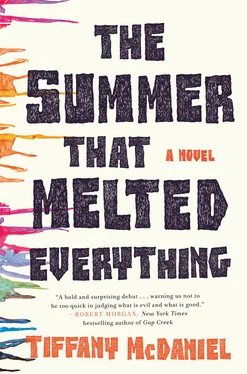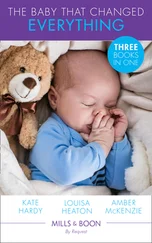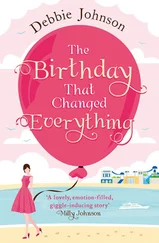Her apron pressed against the sheet as she leaned over him. I thought maybe she would hold the magnets down like he was a refrigerator and she was merely posting notes. A sort of up-and-down motion. Instead she slid the magnets across him, a different one for each part of his body. She believed each magnet only had enough strength in it to lift the metal from one body part, and after that, it was spent of its power.
When she got to his left arm, she paused at the wide wound stuffed with the gathered blood and leaves and dirt. She started to pick the leaves out, but Dad gently asked her to leave them. It was as if the leaves and dirt provided a foliage to the wound so he wouldn’t have to see the cut so naked and clear. She understood this, and merely moved the magnet around the wound, the drooping tip of one of the larger leaves gliding across the back of her passing hand.
I thought the wound would drop her to her knees in realization of his suicide, but she merely looked at it as if it were just your ordinary difference of no particular sin or exclusive death. She was in such denial, that the wound was just a moment his skin was not at its best.
She removed his shoes and socks and as she slid the magnets over his bare feet, her voice broke as she said, “I know how ticklish your feet are. I’ll scratch ’em good once I’m done.”
And she did too.
His face was last, and as she looked at the pile of used magnets, she lost that control she had so carefully held.
“There ain’t any left. I’ve used ’em all. I don’t have any to lift the metal from his face.” Her cries were like a coming of new death.
Sal went to her and held her hands as he asked her, “Don’t you know a mother’s got ten good magnets at the ends of her fingers? Not enough to take on a body, but a face, yes.”
She looked at her hands, bending her fingers as if testing their strength. As Sal gave her room, she returned to Grand, holding her hands high over his face, standing there for a few seconds as if she was unsure of how to begin. Then as if suddenly realizing exactly how to do it, her hands slowly lowered to his chin, where her fingers stroked back and forth.
I was almost hopeful, watching her hands lie next on his forehead as if they could bring him back. As if her fingers feeling softly down his cheeks were the way to resurrection. I thought this until I saw her face and all its hopelessness, and then I knew there wasn’t going to be a miracle.
I imagined a series of small falls in the world at that moment. Somewhere the petals of a lilac were falling off. Somewhere a moth was heading straight for the ground. Grains of sugar were rolling off the counter. A baseball was losing its soar. Small falls taking me down with them and to that low where no wings can be found and no rising is ever had.
“My baby,” she whispered. “My dear, sweet love of my life. Why did you leave me?”
She waited as if she believed he might rise long enough from the dead to tell her why. When he didn’t, it became a kick to the back of her knees. Dad caught her just in time, bringing them both down to the floor in a hold that made them look like one wound of the same deep stab.
I thought maybe she’d fainted, but she was still open in all the places that can be. She’d just lost her legs for a moment, she said. As Dad held her there, beneath the height of their dead son, I ran.
I ran from my brother’s body. From the town. From the terrible ripping apart. I could hear Sal behind me. I went faster. Between the trees, and up the high land to the edge of the cliff that gave way to the rock quarry below.
“Why’d you follow me, Sal?”
“Fielding—”
He didn’t get to finish what he was going to say because I tackled him to the ground and hit him even before my hands had formed their fists. When they did, boy did they ever mean it. I hated him that moment because I had to hate someone, and Ryker was somewhere too far.
“Why the fuck did you have to come?” I hit and hit until I couldn’t feel my knuckles anymore.
When his punch came, it struck me hard across the chin, knocking me back. He held his fists up as if I would charge him again and he was going to have to fight me off. But I just sat there, holding my jaw in my hand and staring at the long tears streaming down his cheeks.
“I’m so tired of being hit. Why is it always me to get it when the fists come out?” He lowered his own fists as he sat back in a great, exhausted sigh.
The ground seemed the safest place to look, so for the next few moments, we both looked there, struggling with what to do in the aftermath of a god’s death.
Only a squawking bird was heard for a while. And then his hushed voice, saying, “I tried, Fielding. To save him. I swear that to you.”
His tongue reached and tasted the blood from his nose.
“How’d you try to save ’im, Sal?”
“I told him the story of Century.”
I closed my eyes. “Well, go on then. Tell it to me.”
“We all called him Cen. He had a vineyard, and one winter he found a grape growing out of season.
“He ate the grape, and people said he was sick for doing so. That it was unnatural to eat a grape out of season. That it went against the laws of God. They forgot that God is the great authorizer, and a grape can grow out of season only with His permission first.
“The people, in their fear and ignorance, chased Cen out of the town and into the woods. There he lived alone and unhappy as the sick Cen no one could accept.
“Then came the day the light went out. No sun shone. No flashlights turned on. No candles would light. God wanted the people to realize who they had chased away, so He left them in darkness to find out.
“After weeks of night, a light suddenly appeared in the woods. The people, desperate and hungry for light, ran to it, surprised to find Cen. They had been so certain of what they thought was wicked. Of what they thought was a sick desire. And yet, in that darkness, Cen was the only light God allowed.
“The light was coming from Cen’s blood. He had cut his finger by accident in the dark, and his blood was a bright pouring. That was what eating the grape had done. Light was the gift, the beautiful result of the man who dared not question his hunger for that which grows out of season.
“The sorry people fell to their knees before this very light. They said they were wrong to run him out of town. They had been fools, they cried. Won’t you forgive us? they asked.
“Other men would have turned them away, but Cen was a grand man and he allowed them to stay in the light. He would have allowed them to stay there forever, but his finger stopped bleeding and when that happened, the light stopped as well.
“‘It’s so dark again,’ they cried. ‘How will we ever get home?’
“‘I can help you home,’ Cen said.
“‘But how? You’ve no more light.’
“He took out his pocketknife and cut his arm, the light shining them through the woods to town. There were so many people to see home, Cen had to keep cutting his arm in order to bleed more light.
“After walking the last person home, he had to sit down, for he was far too weak to continue. He’d bled so much for them and there was no more to bleed, not even a drop left. He died alone and in the dark.
“The next morning, in the light of the returned sun, everyone saw the body of Cen on the ground. I guess some say he killed himself, cutting his arm like that, and I guess he did. But at least he killed himself on the way to something else. And that’s what I told Grand.
“I said to him when you hold the knife, you have to ask yourself will more light come from this than dark? And if the answer is yes, then by all means cut away. If through your death, you can walk someone home, then do it — but if by your death, they lose a home, then think again.
Читать дальше












